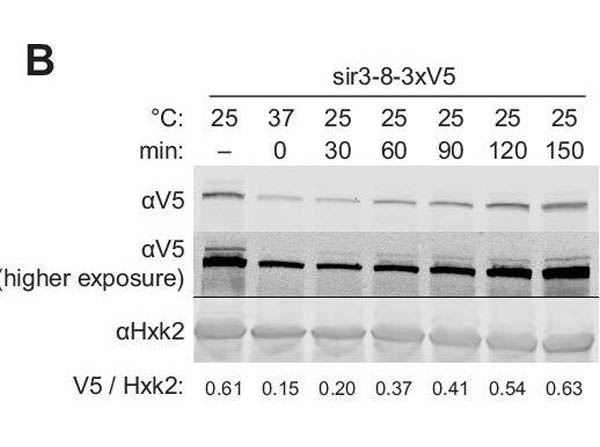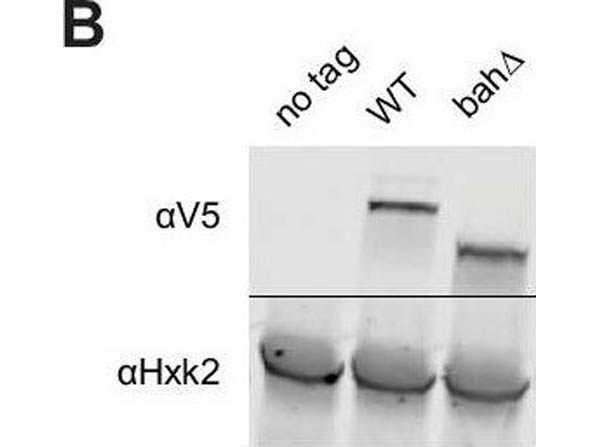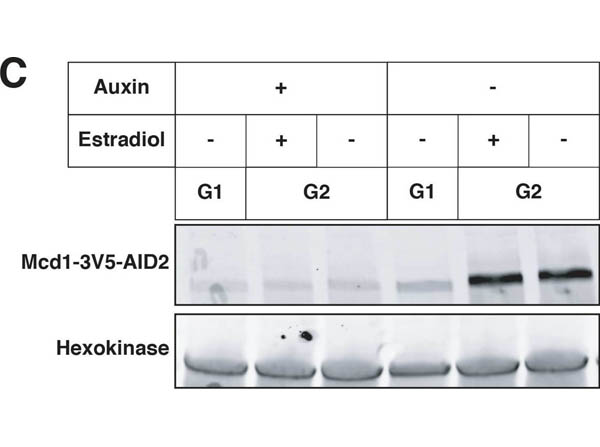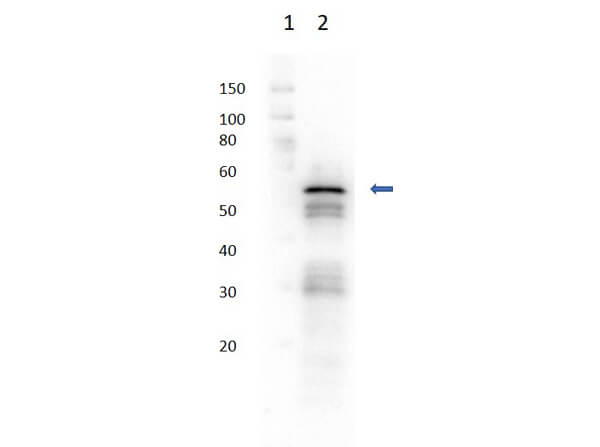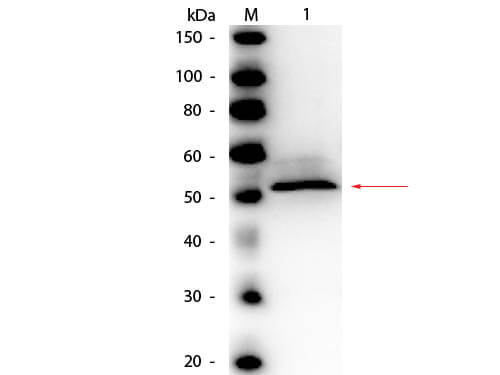Datasheet is currently unavailable. Try again or CONTACT US
Hexokinase Antibody
Rabbit Polyclonal
15 References
100-4159
2 mL
Lyophilized
WB
Hexokinase (Yeast)
Rabbit
Shipping info:
$50.00 to US & $70.00 to Canada for most products. Final costs are calculated at checkout.
Product Details
Anti-Hexokinase (Yeast) (RABBIT) Antibody - 100-4159
rabbit anti-Hexokinase Antibody, DKFZp686M1669 antibody, Hexokinase 2 antibody, Hexokinase 2 muscle antibody, Hexokinase type II antibody
Rabbit
Polyclonal
Antiserum
Target Details
HXK2 - View All HXK2 Products
Hexokinase (Yeast)
Native Protein
Hexokinase [Yeast]
This product was prepared from monospecific antiserum by a delipidation and defibrination. Assay by immunoelectrophoresis resulted in a single precipitin arc against anti-rabbit serum, purified and partially purified Hexokinase [Yeast]. Cross reactivity against Hexokinase from other tissues and species may occur but have not been specifically determined.
Application Details
WB
- View References
Anti-Hexokinase is suitable for use in ELISA, western blot, and immunohistochemistry. Specific conditions for reactivity should be optimized by the end user.
Formulation
80 mg/mL by Refractometry
0.02 M Potassium Phosphate, 0.15 M Sodium Chloride, pH 7.2
0.01% (w/v) Sodium Azide
None
2.0 mL
Restore with deionized water (or equivalent)
Shipping & Handling
Ambient
Store vial at 4° C prior to restoration. For extended storage aliquot contents and freeze at -20° C or below. Avoid cycles of freezing and thawing. Centrifuge product if not completely clear after standing at room temperature. This product is stable for several weeks at 4° C as an undiluted liquid. Dilute only prior to immediate use.
Expiration date is one (1) year from date of receipt.
Hexokinase is the main glucose phosphorylating enzyme. It may play a regulatory role in both induction and repression of gene expression by glucose. In yeast there are three glucose-phosphorylating isoenzymes, designated hexokinase I, II and glucokinase. This protein is involved in the pathway hexose metabolism, which is part of Carbohydrate metabolism.
Ben-Menachem RH et al. (2023). Mitochondrial-derived vesicles retain membrane potential and contain a functional ATP synthase. EMBO Rep.
Applications
WB, IB, PCA
Brothers, M et al. (2022). Distinguishing between recruitment and spread of silent chromatin structures in Saccharomyces cerevisiae. ELife
Applications
WB, IB, PCA
Saxton DS et al. (2022). Distinct silencer states generate epigenetic states of heterochromatin. Mol Cell.
Applications
WB, IB, PCA
Farris D et al. (2021). A novel allele of SIR2 reveals a heritable intermediate state of gene silencing. Genetics.
Applications
WB, IB, PCA
Otto GM et al. (2021). Programmed cortical ER collapse drives selective ER degradation and inheritance in yeast meiosis. J Cell Biol.
Applications
WB, IB, PCA
Goodnight D et al. (2020). S-phase-independent silencing establishment in Saccharomyces cerevisiae. Elife.
Applications
WB, IB, PCA
Eisenberg AR et al. (2020). Translation initiation site profiling reveals widespread synthesis of non-AUG-initiated protein isoforms in yeast. Cell Syst.
Applications
WB, IB, PCA
Muller R et al. (2020). CiBER-seq dissects genetic networks by quantitative CRISPRi profiling of expression phenotypes. Science.
Applications
WB, IB, PCA
Lim G et al. (2020). Phosphoregulation of Rad51/Rad52 by CDK1 functions as a molecular switch for cell cycle–specific activation of homologous recombination. Sci Adv.
Applications
WB, IB, PCA
Brothers M et al. (2019). Mutations in the PCNA DNA Polymerase Clamp of Saccharomyces cerevisiae Reveal Complexities of the Cell Cycle and Ploidy on Heterochromatin Assembly. Genetics.
Applications
WB, IB, PCA
King GA et al. (2019). Meiotic cellular rejuvenation is coupled to nuclear remodeling in budding yeast. Elife.
Applications
WB, IB, PCA
Sawyer EM et al. (2019). Developmental regulation of an organelle tether coordinates mitochondrial remodeling in meiosis. J Cell Biol.
Applications
WB, IB, PCA
Brace JL et al. (2019). A cell separation checkpoint that enforces the proper order of late cytokinetic events. J Cell Biol.
Applications
WB, IB, PCA
Lam, MHY et al. (2015). A Comprehensive Membrane Interactome Mapping of Sho1p Reveals Fps1p as a Novel Key Player in the Regulation of the HOG Pathway in S. cerevisiae. Journal of Molecular Biology
Applications
WB, IB, PCA
Thanabalu T et al. (2007). Verprolin function in endocytosis and actin organization: Roles of the Las17p (yeast WASP)‐binding domain and a novel C‐terminal actin‐binding domain. FEBS J.
Applications
WB, IB, PCA
This product is for research use only and is not intended for therapeutic or diagnostic applications. Please contact a technical service representative for more information. All products of animal origin manufactured by Rockland Immunochemicals are derived from starting materials of North American origin. Collection was performed in United States Department of Agriculture (USDA) inspected facilities and all materials have been inspected and certified to be free of disease and suitable for exportation. All properties listed are typical characteristics and are not specifications. All suggestions and data are offered in good faith but without guarantee as conditions and methods of use of our products are beyond our control. All claims must be made within 30 days following the date of delivery. The prospective user must determine the suitability of our materials before adopting them on a commercial scale. Suggested uses of our products are not recommendations to use our products in violation of any patent or as a license under any patent of Rockland Immunochemicals, Inc. If you require a commercial license to use this material and do not have one, then return this material, unopened to: Rockland Inc., P.O. BOX 5199, Limerick, Pennsylvania, USA.

